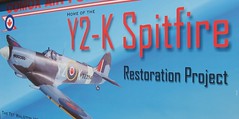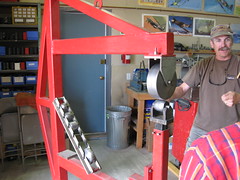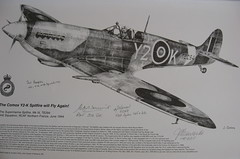So we saw
The Descent recently, and it rocked pretty hard. Which pleased us, because we were really pulling for the director, one Neil Marshall, to do good. We like him. If you haven't seen
Dog Soldiers, see it. You'll like it. Or else you are bad.
Anyway, Steph got pretty jived up about it, and next thing I know, she's got me proofreading an essay-thing that she wrote about it, and as soon as I'm done reading it I say, "Hey, can I post this on my blog?" So here it is.
Everything I Needed to Know About Writing Horror I Learned From Neil Marshall:
Last night Corey and I went to see
The Descent, the latest from Neil Marshall of
Dog Soldiers fame. I loved this excellent and ambitious -- if flawed -- films for many, many reasons but mostly for these two:
- The moral of the film which is, in my opinion, that killing another human being is an act that is NEVER ACCEPTABLE UNDER ANY CIRCUMSTANCES.
(A pithy comment given how most of the killing we see in the news often comes across as 'justified' because it is killing that comes out of grief, survival and/or fear. In the film, Marshall shows us people killing under these circumstances and, as a result, we understand why they're doing it but, in doing so, he says, they move beyond redemption.)
- Thinking about the film made me suddenly understand why Corey and I haven't been able to get our horror movie idea up off the laboratory table, despite hours and hours of brainstorming sessions. (Get it? Laboratory? Brain? Storming?)
To elaborate more on this point (point #2), let me take you back in time to a few years ago when Corey and I (being both a tall and a short fan, respectively, of the horror genre) decided that we wanted to write a horror film and were trying to decide to write about. Having read Stephen King's
Danse Macabre and also Shakespeare, we decided we were clever enough to come up with a way to think about horror and -- after many, many caffeine and alcohol-fueled conversations -- we decided that horror was about fear. For instance:
- Fear of losing one's identity (Invasion of the Body Snatchers)
- Fear of puberty (I Was A Teenage Werewolf)
- Fear of one's pubescent child who has suddenly turned into, like, a monster -- all cussing and masturbating and rejecting traditions and picking boyfriends who treat them like crap (that movie with Linda Blair which I can't name and even now -- just thinking about it a little -- is making my brain curl up like a worm on a fishhook)
- Fear of going crazy (The Haunting)
- Fear of being alone (The Haunting)
- Fear of homosexuality (The Haunting)
- Fear of the supernatural (The Haunting)
- Fear -- in the post-Nietzschean world where God and the Devil are dead -- of the faceless, enormous and incomprehensible forces of the universe that make, among other things, the multifaceted eyeballs of flies and light-devouring black holes (The Haunting. I kid -- anything Lovecraftian)
- Fear of the irrevocable things we're doing to the environment (Prophecy and Godzilla)
- Fear of what media technology is doing to intimacy (Videodrome)
- Fear of what genetic manipulation is doing to our humanity (The Fly)
- Fear of women who like sex (Dracula)
- Fear of losing one's identity AND becoming one of the faceless masses (Zombie movies generally speaking)
And so on.
Armed with such kuhnowledge, Corey and I determined that if we were going to write a horror movie then our first step should be deciding what fear and/or fears the movie was going to be about. Corey voted himself secretary, picked up his little black book and a pen and we sat down to hash out some ideas:
Corey: Okay. What scares the crap of out people?
Steph: Demonic possession.
Corey: (writes that down) Okay. What else?
Steph: Demonic possession is very scary.
Corey: Got it. Demonic possession is very scary. Any other things that are scary? What about dying horribly? Everyone has that fear.
Steph: Yeah, like when you allow yourself to be possessed by the Devil and then throw yourself out a window so you can tumble down a veritable mountain of stone steps in Georgetown so that you can crack your skull open and bleed to death thereby putting one over on Old Nick.
Corey: ...
Steph: That's a pretty horrible death, if you ask me. Death by demonic possession. You're not writing that down.
Corey: Look. Stephanie. Not everyone has this completely irrational fear of demonic possession because they were told when they were little kids that Satan could appear at any time. Okay?
Steph: Really?
Corey (pausing to consider the implications of saying 'yes', just for fun): ...
Steph: Seriously?
Corey: = )
Steph: You know, not being taken seriously by one's spouse is pretty scary. For the other person doing the not taking of the serious, I mean. Particularly when the first person is full of irrational fears and in possession. Of sharp objects.
Corey: Bad puns are pretty scary.
Steph: Let's try and come up with fears that are relevant to our society today.
Corey: What about the fear of being invaded? (Writes this down.)
Steph: Like by aliens?
Corey: By anything. Having one's personal space invaded.
Steph: Remember that scene in SE7EN where that guy has to put on that dildo?
Corey: Let's just start with the fears and then we can specific.
Steph: Good idea. Okay. Being invaded by demons would be pretty scary. Why aren't you writing that down?
As you can see, Corey and I weren't getting very far. There are so many things we can fear: global warming, Alzheimer's, teenagers who loiter, Satan, losing our way of life to religious maniacs with bombs, dying, becoming parents, watching our parents get old, men who are always scratching their balls, nuclear war, Paula Abdul, being rejected because we're: ugly, a girl, too tall (i.e., different from everyone else), &tc., &tc., &tc.
We were trying to come at the story from fear's point of view (so to speak), thinking we needed to have the fear first (because, remember, horror is about fear) before getting the rest of the plot, characters and all that stuff. Well, I have to tell you, maybe other people have come up with great horror stories this way but it sure wasn't working for us.
Flash forward to last night. Or, rather, today, when I was washing dishes and thinking about
The Descent and how much I loved the moral of that film which reminded me that horror stories are ultimately moral stories. (I'm acknowledging King and
Danse Macabre here as the source of this idea for me. Also, as I recall from watching the commentary on
that movie which allowed me to think about it rationally for all of about 6.66 seconds, William Friedkin indicated he had a specific moral agenda with that picture and he thought he succeeded in bringing it across.) (If you want to know, watch the movie and then the commentary. Because then I will not be alone in my suffering.)
So then, taking this premise that horror stories are moral stories (thought I) the best way to approach a doing a horror story would be from a MORAL point of view rather than a FEAR point of view, if you see what I'm saying. And the more I thought about this, the more it made sense because -- you know what? -- morality can be fucking scary. Because what morality boils down to is two ways of seeing the world: the good way and the bad way.
To wit: let's say that we believe that women should cover their bodies and stay at home and not read and write. Let's say that's our moral: that women who walk around uncovered in public and/or who read and write and/or teach other women to read and write are BAD. Then let's see what happens when people, mostly men, let's say, decide they feel very seriously about this moral and also have access to stones and total impunity to use those stones. What happens then when they go looking for BAD women? Well then, the BAD women get stoned to death. That's pretty horrific, I'd say. And this is what horror stories (both real and created) are about: taking a moral and pursuing the consequences of that moral to extreme conclusions that can and usually do involve killing.
So then, re-examining horror stories with our black and white moral point of view (as opposed to our pea-soup-tinted fear point of view),
I Was a Teenage Werewolf is about how boys who can't control themselves during puberty are bad and will get lynched. Or how
that movie is saying (among many, many other things, which is one of the reasons why it's such an excellent film) that if the church doesn't step in and try to understand youth then it will be bad and thus powerless. Or how
Videodrome is an example of 'the scanner darkly' principle (which I will elaborate on some other time) which tells us that we can only find ourself within ourself, not in the media's reflections of reality, which are bad reflections that will drive us to suicide. Or how
The Descent is about how when we lose our humanity, even for a moment, we are forever damned.
Horror stories, horror movies let's say, are strange little pieces of work, when you think about it. They exist to show us how horrific things can be when we decide that the world is black and white. But, at the same time, we keep watching the things because we get a great sense of security from seeing the world work in predictable ways, when we see there are definite if horrific consequences (like death or madness or demonic possession) to our actions. To our bad actions. And that's a point that needs to be emphasized: a horror story isn't about watching what happens to people who are good. Horror stories are about seeing what happens to people who are bad.
So, if our moral is that "young people who don't do what they're told are bad" then when we get together with two of our friends to start sticking the lens of our video camera into areas where it doesn't belong, then we get what we deserve. And isn't that how we feel at the end of
The Blair Witch Project? That those kids were TOLD, MANY TIMES not to go nosing around into the Blair Witch's business so it serves them damn well right.
Anyway, getting on with my point about Neil Marshall and writing horror stories and morals, that being:
if I want to write a horror story, I should come up with a moral rather than a fear and, more specifically, I should show what happens when people DON'T follow the moral.
Alrighty then...a story about bad people, about what happens to people who don't follow my moral...
Hmmm.
Let's see...
Okay, how about this: let's say that my moral is that people who don't believe in Christ are bad...that's a start.
So then what happens to them when they don't believe in Christ? Hmmm...well, Satan always terrifies the crap out of me, so why don't we bring in Satan?
Well, would you look at that, this moral approach is really working out! I've got my main characters: people who don't believe in Christ. And I've got my 'bad guy': Satan. But where's my action? What does Satan actually do to people who don't believe in Christ?
I guess he could tickle them till they peed their pants. Because peeing your pants is pretty awful. Or he could torment them by talking really loudly about the new Strokes record while they're sitting in a movie theatre trying to watch a movie. Hmmm. Or maybe he could appear invisibly when they're in a elevator all by their lonesome and fart, silently but perilously, so that they're awash in an unholy stench of unknown origin...
Well, I'll work out the details later.
Alrighty! Now we're cooking with gas. OH. HEY. I KNOW. Let's say that when people don't believe in Christ they go to HELL!
"Yes, Hell; where Satan belches fire, and enormous devils break wind both night and day! Hell; where the mind is never free from the torments of remorse, and your bottom never free from the pricking of little forks! (Noooo! Spare me the little forks!") (to quote from Blackadder.)
Okay, so maybe I'm going a little overboard here but I honestly think this is where horror comes from -- a need to frighten people into doing what we want them to do.
But why? Why do we do this?
So often (and I'll thank King's
Danse Macabre again here) the morals we see expounded in horror films are morals that encourage staunchly conservative behaviour (aren't the Friday the 13th movies about what happens to teenagers who GET IT ON -- if you know what I mean, and I think you do -- before marriage?). Or morals that show us how people who are different will be killed or made as good as dead by being thrown out of the community as outcasts.
Or they're morals that remind us of what happens to us when we get too uppity, when we hubristic little humans think we can control forces beyond our control. Ripley survives in
Alien because she is the ONLY one who actively and almost prissily, you could say, follows the rules. She's the one who tries to stop Ash, telling him that he's breaking the quarantine rules by letting John Hurt's alien-incubating character (who's name I can't remember right now) back on the ship. Rules are put in place for a reason, rules are meant to help us survive against larger, incomprehensible forces that are out to get us and horror stories will forever be about what happens to people who break these rules.
The Descent really stood out for me from other horror films I've seen because Marshall's moral seems to be coming from a less...conservative...place: don't kill people. Yes. Absolutely. If one is going to have a moral that is a good moral to have. But there is no forgiveness in this film. Because it's a horror film. And the bad people -- even when they're kind young Scottish women who are grieving and struggling to find themselves after losing their husband and daughter in tragic and unforeseeable car accidents -- MUST be punished.
And I'm not digressing here, really, because thinking about this agenda of horror makes me wonder if I really do want to write a horror story. Don't get me wrong. I'm just as full of "people who do _____ should have their eyeballs squeezed out" thoughts as much as the next person (and, except for maybe the Dalai Lama and Jesus Christ, we're ALL like that...maybe the devil makes us do it, I don't know) but I wonder if this is the kind of art I want to make.





